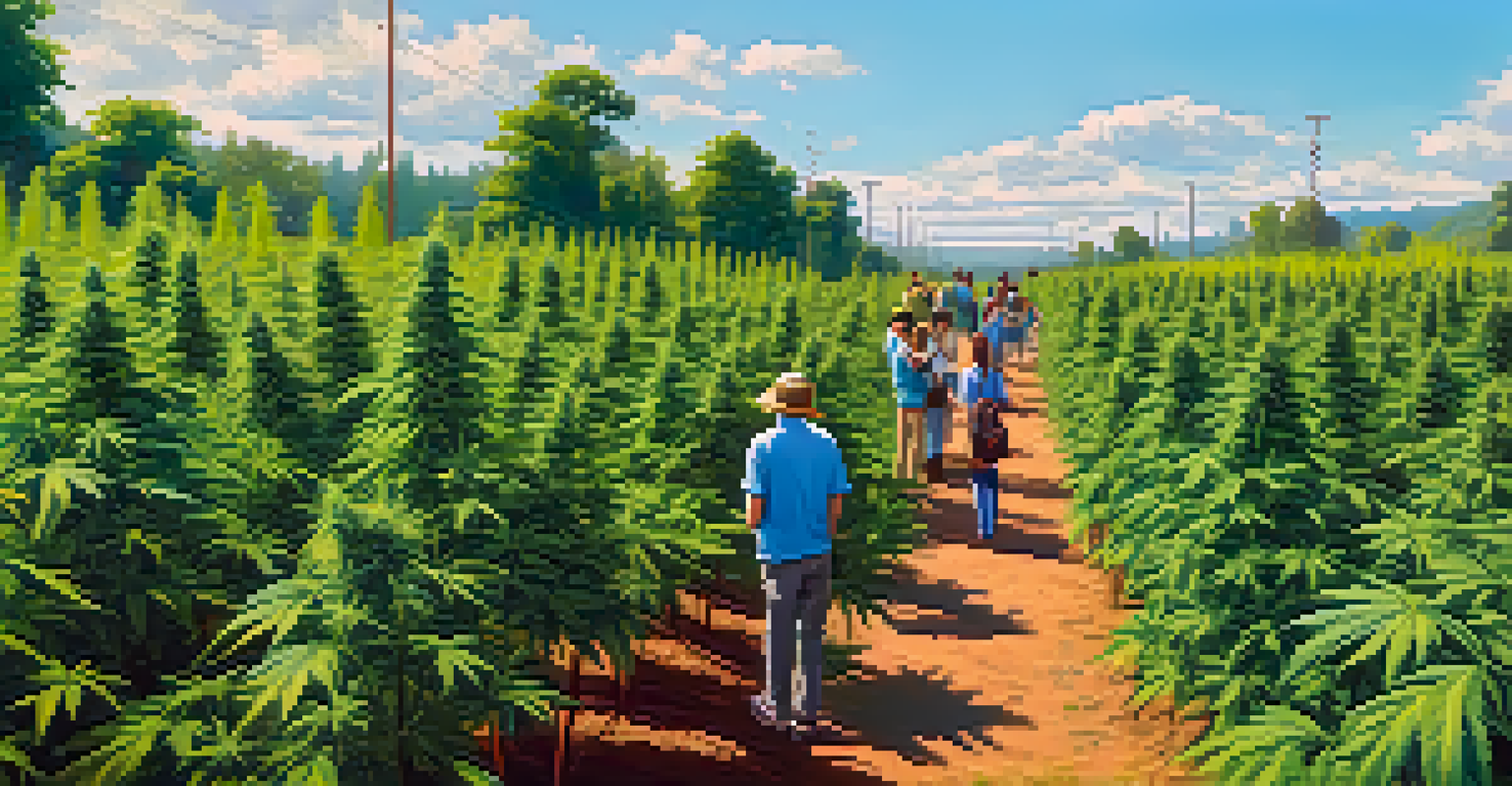Marijuana Legalization and Its Influence on Tourism Industries

Understanding Marijuana Legalization and Its Scope
Marijuana legalization refers to the process of making the use, sale, and possession of cannabis legal under specific regulations. This shift has been seen in various regions worldwide, particularly in places like Canada and several U.S. states. By removing criminal penalties, these areas aim to regulate cannabis similarly to alcohol or tobacco, which has sparked significant interest from both residents and tourists.
The legalization of marijuana is not just a matter of changing laws; it's about changing minds and perceptions.
The implications of legalization extend beyond just legal boundaries; they also encompass economic, social, and cultural dimensions. For instance, communities that once feared the consequences of illegal use are now exploring the potential benefits from regulated markets. This transition opens the door to a new wave of tourism focused on cannabis culture, wellness, and recreation.
As more places adopt legalization, understanding its broader impact on tourism becomes essential. Tourists are increasingly seeking destinations that offer cannabis experiences, creating new opportunities for businesses and local economies. This trend is reshaping travel preferences and destinations, influencing how areas market themselves.
The Economic Boost from Cannabis Tourism
Cannabis tourism has emerged as a lucrative sector for regions that embrace legalization. Tourists often flock to areas where they can legally purchase and consume cannabis, leading to increased revenue for local businesses. From dispensaries to cannabis-friendly hotels and tours, the economic ripple effect is significant, contributing to job creation and local tax revenue.

For example, in Colorado, where marijuana was legalized in 2012, the tourism industry saw a noticeable uptick. The state reported millions in tax revenue from cannabis sales, which was subsequently invested in public services and infrastructure. This infusion of cash not only benefits the state but also enhances the overall tourist experience.
Economic Growth from Cannabis Tourism
Cannabis tourism significantly boosts local economies by generating revenue for businesses and increasing tax income for public services.
Moreover, cannabis tourism attracts a diverse demographic. From seasoned enthusiasts to curious newcomers, these visitors contribute to a vibrant local culture that celebrates cannabis. This diversity helps to foster a community that embraces inclusivity and education around responsible consumption.
Changing Perceptions of Cannabis Use
The legalization of marijuana is gradually shifting public perceptions, making it more socially acceptable. As cannabis becomes normalized, tourists feel more comfortable exploring cannabis-related activities during their travels. This change is akin to how attitudes toward alcohol and tobacco have evolved over the decades.
Tourism is an opportunity to connect with people and cultures, and cannabis is part of that evolving narrative.
Many people now view cannabis not just as a recreational substance but also as part of a wellness lifestyle. This perception is driving interest in cannabis-infused products, wellness retreats, and educational tours. These experiences appeal to a broader audience, including those who may not have previously considered cannabis.
With changing perceptions, destinations can market themselves as progressive and forward-thinking. This branding attracts tourists who value openness and diversity, enhancing the region's appeal and potentially leading to longer stays and repeat visits.
Challenges Facing the Cannabis Tourism Sector
Despite its growth, the cannabis tourism sector faces several challenges. Legal discrepancies between states and countries can create confusion for travelers. For example, while cannabis may be legal in one state, crossing borders with it remains illegal, leading to potential legal issues for tourists.
Additionally, some regions may struggle with inadequate infrastructure to support the influx of cannabis tourists. This includes everything from transportation to accommodations and cannabis-friendly activities. Without proper planning, areas could find themselves overwhelmed during peak tourist seasons.
Changing Attitudes Toward Cannabis
The legalization of marijuana is normalizing its use, leading tourists to explore cannabis-related activities as part of their travel experiences.
Finally, there's the ongoing stigma associated with cannabis use that can deter some potential visitors. Overcoming these hurdles requires a concerted effort from local governments, businesses, and communities to foster an environment that welcomes cannabis tourism while ensuring safety and legality.
Innovative Business Models in Cannabis Tourism
As the cannabis tourism industry evolves, innovative business models are emerging to cater to this new wave of tourists. Dispensaries are not just retail shops; they are evolving into experiential spaces that offer tastings, tours, and educational workshops. This hands-on approach helps demystify cannabis and allows visitors to learn about its uses and benefits.
Moreover, many travel companies are offering curated cannabis tours that highlight local dispensaries, farms, and consumption lounges. These packages provide tourists with guided experiences, ensuring they can explore safely and responsibly. This level of engagement enriches the overall travel experience, making it more memorable.
Additionally, cannabis-friendly accommodations are popping up, offering unique stays for travelers. From hotels with on-site dispensaries to rental properties that encourage cannabis use, these options are becoming increasingly popular. They cater to the needs of cannabis tourists while promoting a culture of responsible consumption.
The Role of Education in Cannabis Tourism
Education plays a crucial role in the cannabis tourism industry, helping to foster responsible use and informed consumption. Many destinations are investing in educational programs that teach tourists about the local cannabis laws, strains, and consumption methods. This type of education is vital in ensuring that visitors enjoy their experiences safely and responsibly.
Workshops and classes, often hosted by knowledgeable guides or local experts, provide tourists with a deeper understanding of cannabis culture. These experiences can cover everything from cooking with cannabis to understanding the different effects of various strains. By enhancing their knowledge, tourists can make informed choices that align with their preferences.
Education Enhances Cannabis Experiences
Educational programs in cannabis tourism promote responsible consumption and help visitors better understand local laws and cannabis culture.
Furthermore, education helps bridge the gap between cannabis enthusiasts and those who may be unfamiliar with it. By creating an inclusive environment focused on learning, destinations can attract a wider audience, encouraging curiosity and exploration while reducing stigma.
Future Trends in Cannabis Tourism
The future of cannabis tourism looks promising as more regions consider legalization. As awareness grows and more countries and states embrace cannabis, the tourism industry will likely continue to evolve. This trend could lead to a more standardized approach to cannabis tourism, making it easier for travelers to explore different locations.
Additionally, sustainability is becoming a priority within the cannabis tourism sector. As consumers become more environmentally conscious, businesses are adapting by incorporating sustainable practices in their operations. This could range from eco-friendly packaging to supporting local communities and farms, promoting a more responsible tourism model.

Finally, advancements in technology may also shape the future landscape of cannabis tourism. From mobile apps that help tourists navigate legal cannabis use to virtual reality experiences that educate users about cannabis cultivation, the integration of technology can enhance the overall experience, making it more accessible and enjoyable.